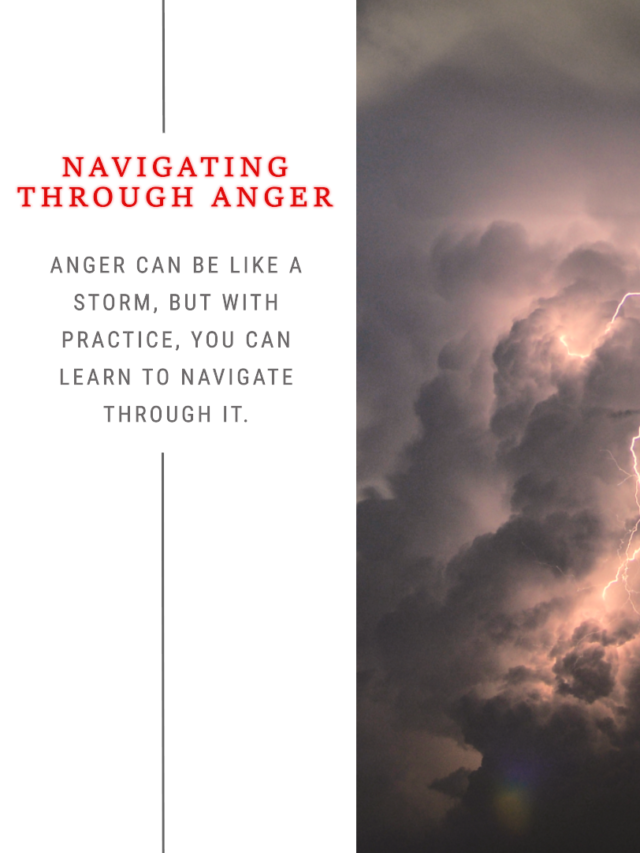Are you tired of feeling overwhelmed by anger? Whether it’s in response to a difficult situation at work, a disagreement with a loved one, or some other trigger, anger is a natural and normal emotion that we all experience. But did you know that anger can actually be a powerful force in our lives?
Here are some insights on the benefits of anger and why it’s essential to learn how to manage it healthily. By accepting and harnessing the power of anger, we can better understand our own needs and boundaries, communicate them to others, and build stronger, more positive relationships.
First, let’s talk about the benefits of anger. When we feel angry, it’s a direct signal that something is not right in our lives. It can help us to identify conflicts, injustices, and other internal issues that need to be addressed. For example, if you’re angry about a coworker who consistently takes credit for your ideas, you can use that anger to set boundaries and assert yourself in the workplace. Or if you’re angry about a friend who always cancels plans at the last minute, you can use that anger to communicate your needs and expectations in the relationship. By acknowledging and accepting our anger, we can better understand our own needs and boundaries and communicate them to others. This can help us to build stronger, more positive relationships and improve our overall mental and physical health.
But what about the drawbacks of anger? When we don’t manage our anger effectively, it can lead to destructive behaviors, such as yelling, aggression, and even violence. It can also harm our physical and mental health, leading to increased stress, anxiety, and other adverse health effects. For example, if you’re angry about a situation at work, but you bottle up your emotions and don’t express them in a healthy way, it can lead to chronic stress and burnout. Or if you’re angry about a disagreement with your partner, but you lash out and say hurtful things, it can damage your relationship and cause unnecessary pain. That’s why it’s essential to learn how to manage our anger healthily and positively.
So, how do we do that? Here are some practical tips for productively managing anger:
Take a break. If you’re feeling overwhelmed by anger, it can be helpful to step away from the situation and allow yourself some time to calm down. This can allow you to collect your thoughts and consider how you want to react. It’s essential to recognize that anger is a temporary emotion, and it will pass if you give it some time. So, take a few deep breaths, go for a walk, or do something else to help you relax and de-stress. For example, you can practice deep breathing, meditation, or yoga to calm your mind and body.
Find healthy outlets for your emotions. Exercise, art, music, or writing can be great alternatives to productively release your anger. These activities can help to distract you from your anger and provide a healthy outlet for your emotions. For example, going for a slow walk in nature and looking at greens can help you to release tension and frustration. Or you can try painting, drawing, or playing an instrument to express your emotions creatively.
Communicate openly and honestly. If you’re angry, it’s essential to communicate your feelings to others calmly and respectfully. This can help to prevent conflicts and misunderstandings. Try to express your feelings clearly and directly and avoid attacking or blaming the other person. For example, instead of saying, “You always do this to me, and it’s so frustrating!” try saying, “I feel upset when you cancel our plans at the last minute. Can we talk about how we can prevent this in the future?” This way, you’re expressing your feelings and needs without placing blame or making the other person feel attacked.
Seek support from friends, family, or a therapist. Sometimes, it can be helpful to talk to someone about your anger and discover strategies for addressing it healthily. A therapist can help you to identify the underlying causes of your anger and provide you with techniques and tools to manage it more effectively. For example, a person you can confide in can help you better understand your anger triggers and how to respond to them reasonably. They can also teach you skills such as assertiveness, mindfulness, and emotional regulation to help you healthily manage your anger.
In conclusion, anger is a natural and normal emotion that we all experience. By accepting it and learning how to manage it, we can harness its power to improve our relationships, communication, and overall well-being. So, the next time you’re feeling angry, remember that it’s a sign that something needs to be addressed by taking the positive approach and using it as an opportunity to better understand your own needs and boundaries and communicate them to others where required. Doing this can help you turn your anger into positive energy in your life.

